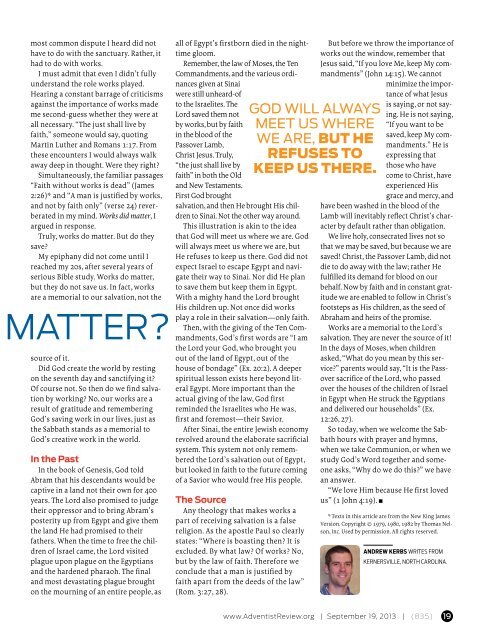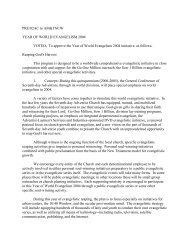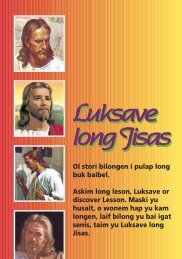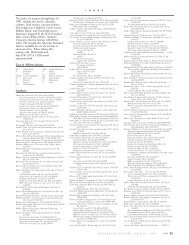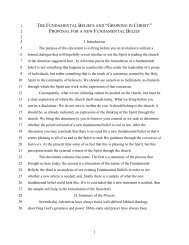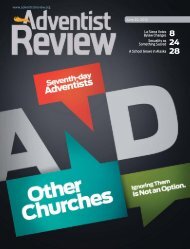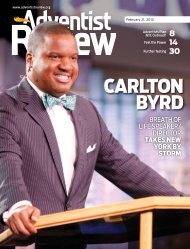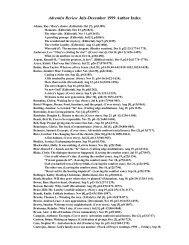Download PDF - Adventist Review
Download PDF - Adventist Review
Download PDF - Adventist Review
- No tags were found...
Create successful ePaper yourself
Turn your PDF publications into a flip-book with our unique Google optimized e-Paper software.
most common dispute I heard did not<br />
have to do with the sanctuary. Rather, it<br />
had to do with works.<br />
I must admit that even I didn’t fully<br />
understand the role works played.<br />
Hearing a constant barrage of criticisms<br />
against the importance of works made<br />
me second-guess whether they were at<br />
all necessary. “The just shall live by<br />
faith,” someone would say, quoting<br />
Martin Luther and Romans 1:17. From<br />
these encounters I would always walk<br />
away deep in thought. Were they right?<br />
Simultaneously, the familiar passages<br />
“Faith without works is dead” (James<br />
2:26)* and “A man is justified by works,<br />
and not by faith only” (verse 24) reverberated<br />
in my mind. Works did matter, I<br />
argued in response.<br />
Truly, works do matter. But do they<br />
save?<br />
My epiphany did not come until I<br />
reached my 20s, after several years of<br />
serious Bible study. Works do matter,<br />
but they do not save us. In fact, works<br />
are a memorial to our salvation, not the<br />
matter?<br />
source of it.<br />
Did God create the world by resting<br />
on the seventh day and sanctifying it?<br />
Of course not. So then do we find salvation<br />
by working? No, our works are a<br />
result of gratitude and remembering<br />
God’s saving work in our lives, just as<br />
the Sabbath stands as a memorial to<br />
God’s creative work in the world.<br />
In the Past<br />
In the book of Genesis, God told<br />
Abram that his descendants would be<br />
captive in a land not their own for 400<br />
years. The Lord also promised to judge<br />
their oppressor and to bring Abram’s<br />
posterity up from Egypt and give them<br />
the land He had promised to their<br />
fathers. When the time to free the children<br />
of Israel came, the Lord visited<br />
plague upon plague on the Egyptians<br />
and the hardened pharaoh. The final<br />
and most devastating plague brought<br />
on the mourning of an entire people, as<br />
all of Egypt’s firstborn died in the nighttime<br />
gloom.<br />
Remember, the law of Moses, the Ten<br />
Commandments, and the various ordinances<br />
given at Sinai<br />
were still unheard-of<br />
to the Israelites. The<br />
Lord saved them not<br />
by works, but by faith<br />
in the blood of the<br />
Passover Lamb,<br />
Christ Jesus. Truly,<br />
“the just shall live by<br />
faith” in both the Old<br />
and New Testaments.<br />
First God brought<br />
salvation, and then He brought His children<br />
to Sinai. Not the other way around.<br />
This illustration is akin to the idea<br />
that God will meet us where we are. God<br />
will always meet us where we are, but<br />
He refuses to keep us there. God did not<br />
expect Israel to escape Egypt and navigate<br />
their way to Sinai. Nor did He plan<br />
to save them but keep them in Egypt.<br />
With a mighty hand the Lord brought<br />
His children up. Not once did works<br />
play a role in their salvation—only faith.<br />
Then, with the giving of the Ten Commandments,<br />
God’s first words are “I am<br />
the Lord your God, who brought you<br />
out of the land of Egypt, out of the<br />
house of bondage” (Ex. 20:2). A deeper<br />
spiritual lesson exists here beyond literal<br />
Egypt. More important than the<br />
actual giving of the law, God first<br />
reminded the Israelites who He was,<br />
first and foremost—their Savior.<br />
After Sinai, the entire Jewish economy<br />
revolved around the elaborate sacrificial<br />
system. This system not only remembered<br />
the Lord’s salvation out of Egypt,<br />
but looked in faith to the future coming<br />
of a Savior who would free His people.<br />
The Source<br />
Any theology that makes works a<br />
part of receiving salvation is a false<br />
religion. As the apostle Paul so clearly<br />
states: “Where is boasting then? It is<br />
excluded. By what law? Of works? No,<br />
but by the law of faith. Therefore we<br />
conclude that a man is justified by<br />
faith apart from the deeds of the law”<br />
(Rom. 3:27, 28).<br />
God will always<br />
meet us where<br />
we are, but He<br />
refuses to<br />
keep us there.<br />
But before we throw the importance of<br />
works out the window, remember that<br />
Jesus said, “If you love Me, keep My commandments”<br />
(John 14:15). We cannot<br />
minimize the importance<br />
of what Jesus<br />
is saying, or not saying.<br />
He is not saying,<br />
“If you want to be<br />
saved, keep My commandments.”<br />
He is<br />
expressing that<br />
those who have<br />
come to Christ, have<br />
experienced His<br />
grace and mercy, and<br />
have been washed in the blood of the<br />
Lamb will inevitably reflect Christ’s character<br />
by default rather than obligation.<br />
We live holy, consecrated lives not so<br />
that we may be saved, but because we are<br />
saved! Christ, the Passover Lamb, did not<br />
die to do away with the law; rather He<br />
fulfilled its demand for blood on our<br />
behalf. Now by faith and in constant gratitude<br />
we are enabled to follow in Christ’s<br />
footsteps as His children, as the seed of<br />
Abraham and heirs of the promise.<br />
Works are a memorial to the Lord’s<br />
salvation. They are never the source of it!<br />
In the days of Moses, when children<br />
asked, “What do you mean by this service?”<br />
parents would say, “It is the Passover<br />
sacrifice of the Lord, who passed<br />
over the houses of the children of Israel<br />
in Egypt when He struck the Egyptians<br />
and delivered our households” (Ex.<br />
12:26, 27).<br />
So today, when we welcome the Sabbath<br />
hours with prayer and hymns,<br />
when we take Communion, or when we<br />
study God’s Word together and someone<br />
asks, “Why do we do this?” we have<br />
an answer.<br />
“We love Him because He first loved<br />
us” (1 John 4:19). n<br />
* Texts in this article are from the New King James<br />
Version. Copyright © 1979, 1980, 1982 by Thomas Nelson,<br />
Inc. Used by permission. All rights reserved.<br />
Andrew Kerbs writes from<br />
Kernersville, North Carolina.<br />
www.<strong>Adventist</strong><strong>Review</strong>.org | September 19, 2013 | (835) 19


